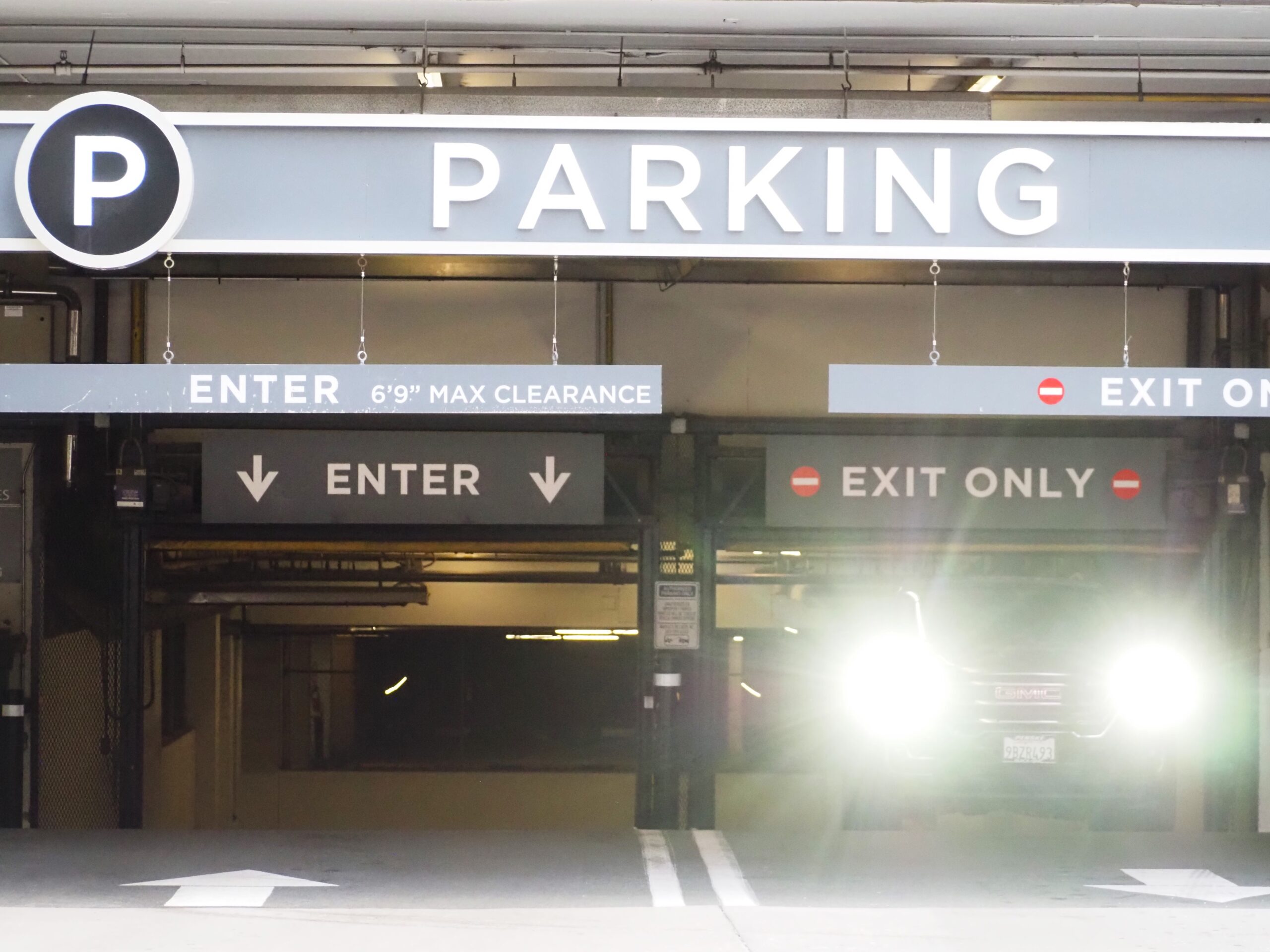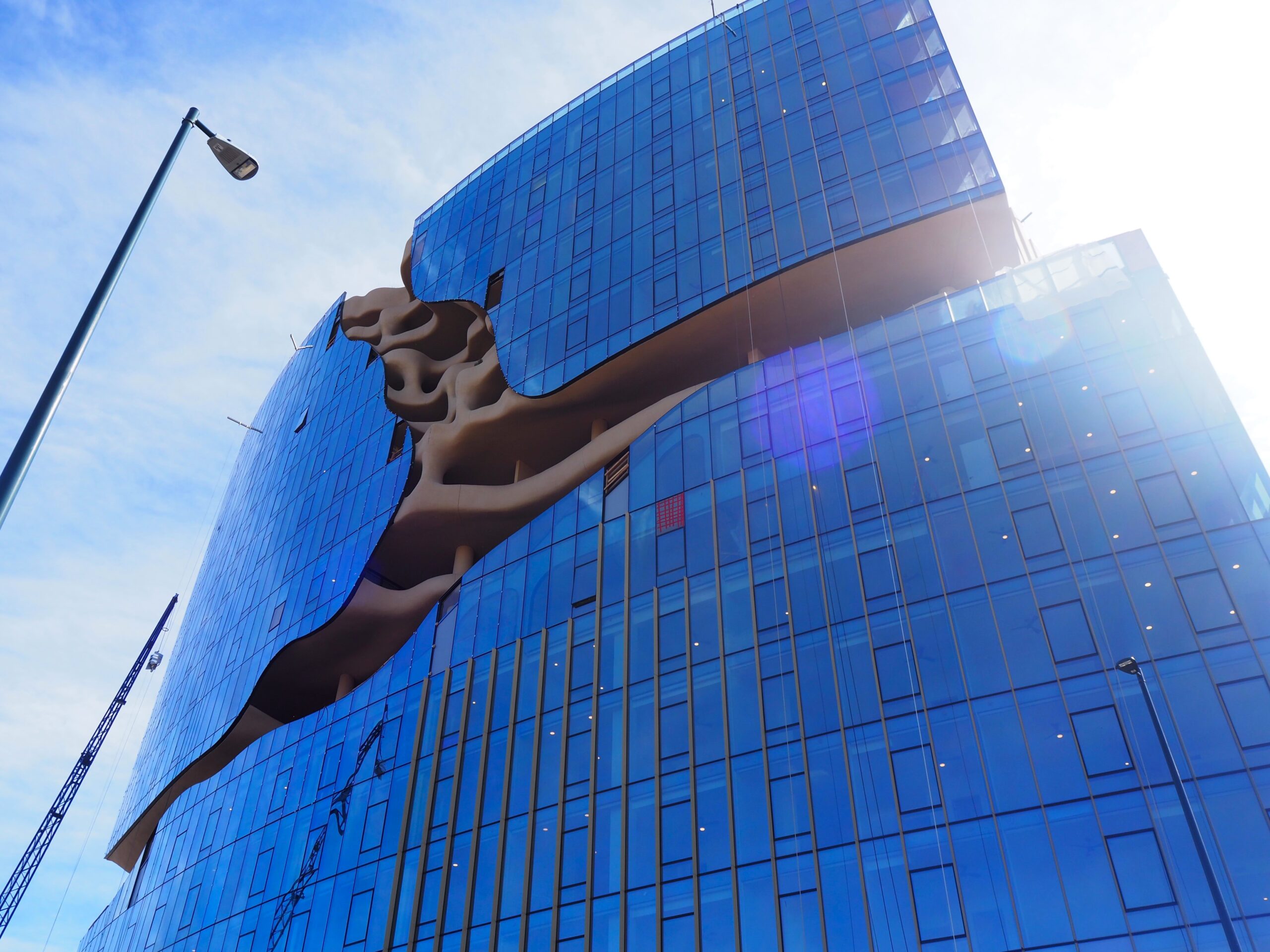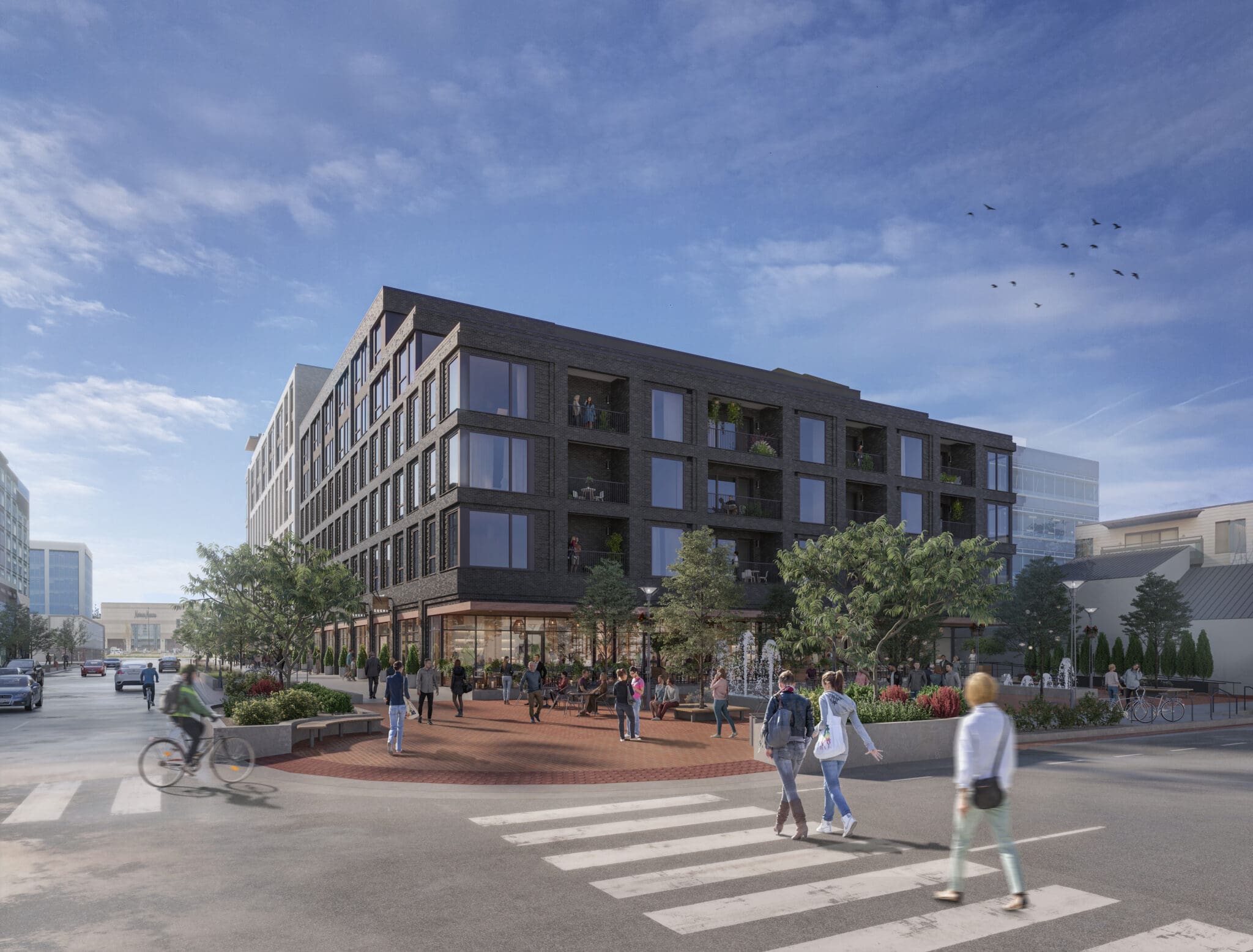
A vehicle exits the Tabor Center parking garage in downtown Denver on Dec. 10, 2024. (Thomas Gounley/BusinessDen)
This week, Denver developer Matt Joblon began construction on a new project in Cherry Creek.
The Oasis Apartments, at 299 Milwaukee St., will have 177 residential units and 28,000 square feet of ground-floor retail space.
And, like nearly every big new building that goes up in Denver, it will also have parking.
City regulations required Joblon, the CEO of Denver-based BMC Investments, to incorporate one parking space per residential unit at Oasis, and another 2.5 spaces per 1,000 square feet of retail space, he said — just under 250 spaces in all.

Matt Joblon
But Joblon is going beyond that. He’s incorporating more than 300 spaces — 1.25 per residential unit, and three per 1,000 retail square feet.
“As developers, we have to meet the market where it is,” Joblon said.
So, as Denver Mayor Mike Johnston looks to eliminate city parking minimums, Joblon isn’t protesting. But he also said the change “wouldn’t have any impact on the projects we do in Denver.”
“In the areas where we develop, including in Cherry Creek, we have to build parking,” he said.
In a series of interviews with BusinessDen on Tuesday, Joblon and other developers said their parking decisions are largely driven by tenant demand, or investors and lenders. Developers generally expect few future projects to alter their space count specifically due to the elimination of parking minimums, if that change is made.
Parking minimums refer to the lowest number of parking spaces a project must incorporate. Existing city requirements vary based on neighborhood and other factors. There are already no parking minimums downtown and in adjacent neighborhoods like the Golden Triangle. Eliminating minimums would not bar developers from building parking. It would just give them the option of skipping parking.
There’s no guarantee parking minimums will be elimated. The change will need to be approved by the Denver City Council. Councilwoman Amanda Sawyer said Monday she’ll vote no. Councilman Kevin Flynn expressed skepticism. And Councilwoman Amanda Sandoval said she expects a lot of feedback from residents.

The front of the One River North building at 3930 Blake St. in March 2024. (BusinessDen file)
“Let the open market decide that”
From an architectural standpoint, the most unusual apartment building completed in Denver this year was One River North, at 3930 Blake St. One side features a so-called “canyon” that will, when it grows in, be filled with greenery.
Brian Wynne, of Wynne Yasmer Real Estate — which was part of the building’s development team — said his reaction to eliminating parking minimums is “generally favorable” because it amounts to deregulation.

Brian Wynne
“Let the open market decide that,” he said.
But the open market, he cautioned, is currently deciding that parking is needed.
The city didn’t require any parking spaces at One River North, which is across from a rail and bus station. But Wynne and his partners still built about one for every unit.
“As great as our public transit can be in certain parts of the city, most residents that we see still have a vehicle,” he said.
Wynne and his partners went so far as to build their parking underground. He said that’s about $25,000 more expensive per space than an above-ground garage, which in turn is more expensive than a surface parking lot. But it makes a project look better, he said, and it allows developers to maximize how many apartments they build.
“The near-to-intermediate future you won’t see a major change (is) in how much parking is built into projects,” Wynne said.
It’s possible that may change in the longer-term, he said, but that likely depends more on technological advancements, such as wider implementation of self-driving cars.
Across Denver, Wynne said, parking “is actually overbuilt.” But it’s not necessarily realistic for, say, apartment residents to use a nearby office building’s garage after workers go home for the day. Residents want a space in their building. And investors or lenders might not go for it.
“If you’re trying to get creative on parking situations, you do have that hurdle of investors and lenders getting comfortable with that creativity,” he said.

Churchill Bunn
Denver-based Alpine Investments is currently building apartments in Berkeley and the Golden Triangle, and has more planned in Bonnie Brae and Union Station North. Managing Partner Churchill Bunn said capital “wants to see parking at a certain level unless you’re in a very specific location.”
“We have a project at .7 stalls per unit that some capital is questioning being too low even though there are overflow options nearby,” Bunn said in an email.
Bunn said the change needs to be accompanied by “a larger financial commitment to making public transit more safe, accessible/convenient and attractive to get high-earning renters to use it.” And he said the city should incentivize shared parking and make changes to the residential permit system for street parking.
David Zucker, CEO of Zocalo Community Investment, also built apartments in RiNo — the Edit building at 3463 Walnut St. The city didn’t require parking at that project either, but he ended up doing .86 spaces per unit.

David Zucker
Still, Zucker said the mayor’s proposal is “exactly what he should do,” and that he believes some projects — specifically those with smaller units, trying to price rent as cheap as feasible — will take advantage.
The suburbs could benefit from eliminating parking minimums even more, Zucker said.
As for parking maximums, which Councilwoman Sawyer mentioned at a Monday meeting, although there’s no formal proposal to implement them? Zucker is not a fan.
“Boulder does, and that’s a mistake,” he said.
Denver-based MGL Partners, meanwhile, has developed some 1,400 units within Denver, with many of those income-restricted. But tenants in those projects generally want parking too, given that they’re often in the service industry and thus don’t get to work from home.
“We’ll continue to build a reasonable amount of parking, with possible an eye for a slight reduction,” MGL co-founder Greg Glade said.

A rendering of BMC Investment’s Oasis Apartments at the corner of 3rd Avenue and Milwaukee St. in Cherry Creek. The project was designed by Shears Adkins Rockmore and will be constructed by The Beck Group. (Courtesy BMC Investments)
Joblon: Better ways to drive down cost of housing
Back in Cherry Creek, Oasis is Joblon’s 12th project in the neighborhood. In addition to apartments, he’s built hotels and office space. He bought the land for Oasis from the Gart family in 2022 for $30.8 million. Completion is expected in early 2027.
When the mayor announced his plan to eliminate parking minimums, he described the potential change as “a market-based solution that will help deliver our goal of a Denver that is truly affordable for working families without impacting parking needs for our residents.”
Joblon said he doesn’t think it “will make a material difference.”
“Most developers, investors or lenders will not want to be the pioneer and build a project with no parking, when the competing project one block away has parking,” he said. “It is an unnecessary risk to take.”
Instead, Joblon said, the city should focus on other changes.
He suggested getting rid of Denver’s “Expanding Housing Affordability” program, which requires residential projects to either include a certain number of income-restricted units — generally around 10 percent of unit count — or pay a large fee.
Non-residential projects, meanwhile, have to pay an “impact fee,” which is set aside to fund income-restricted housing projects. Joblon thinks those fees should be lowered.
“No one can make any deal pencil due to these cost-prohibitive initiatives,” he said.
Finally, Joblon said, Denver needs to streamline the development plan review and entitlement process, so people can build things faster.
“It should never take more than 12 months to get a shovel in the ground,” he said.
If those changes are made, Joblon said, developers from around the country would rush to build in Denver. Capital would be incentivized to take on risk. More units would be built.
“When that happens, housing costs will come down dramatically. We cannot legislate our way into making a market more affordable — that has never worked and always has the opposite effect,” he said.
Back in RiNo, at One River North, Wynne said leasing demand is “solid,” but “as unique as the property is, it’s still not immune to the oversupply.” Although few new projects are breaking ground around the city, a lot of ones that began construction months or years ago are wrapping up.
“We are offering concessions, which wasn’t the plan originally, but we have to stay competitive,” Wynne said.

A vehicle exits the Tabor Center parking garage in downtown Denver on Dec. 10, 2024. (Thomas Gounley/BusinessDen)
This week, Denver developer Matt Joblon began construction on a new project in Cherry Creek.
The Oasis Apartments, at 299 Milwaukee St., will have 177 residential units and 28,000 square feet of ground-floor retail space.
And, like nearly every big new building that goes up in Denver, it will also have parking.
City regulations required Joblon, the CEO of Denver-based BMC Investments, to incorporate one parking space per residential unit at Oasis, and another 2.5 spaces per 1,000 square feet of retail space, he said — just under 250 spaces in all.

Matt Joblon
But Joblon is going beyond that. He’s incorporating more than 300 spaces — 1.25 per residential unit, and three per 1,000 retail square feet.
“As developers, we have to meet the market where it is,” Joblon said.
So, as Denver Mayor Mike Johnston looks to eliminate city parking minimums, Joblon isn’t protesting. But he also said the change “wouldn’t have any impact on the projects we do in Denver.”
“In the areas where we develop, including in Cherry Creek, we have to build parking,” he said.
In a series of interviews with BusinessDen on Tuesday, Joblon and other developers said their parking decisions are largely driven by tenant demand, or investors and lenders. Developers generally expect few future projects to alter their space count specifically due to the elimination of parking minimums, if that change is made.
Parking minimums refer to the lowest number of parking spaces a project must incorporate. Existing city requirements vary based on neighborhood and other factors. There are already no parking minimums downtown and in adjacent neighborhoods like the Golden Triangle. Eliminating minimums would not bar developers from building parking. It would just give them the option of skipping parking.
There’s no guarantee parking minimums will be elimated. The change will need to be approved by the Denver City Council. Councilwoman Amanda Sawyer said Monday she’ll vote no. Councilman Kevin Flynn expressed skepticism. And Councilwoman Amanda Sandoval said she expects a lot of feedback from residents.

The front of the One River North building at 3930 Blake St. in March 2024. (BusinessDen file)
“Let the open market decide that”
From an architectural standpoint, the most unusual apartment building completed in Denver this year was One River North, at 3930 Blake St. One side features a so-called “canyon” that will, when it grows in, be filled with greenery.
Brian Wynne, of Wynne Yasmer Real Estate — which was part of the building’s development team — said his reaction to eliminating parking minimums is “generally favorable” because it amounts to deregulation.

Brian Wynne
“Let the open market decide that,” he said.
But the open market, he cautioned, is currently deciding that parking is needed.
The city didn’t require any parking spaces at One River North, which is across from a rail and bus station. But Wynne and his partners still built about one for every unit.
“As great as our public transit can be in certain parts of the city, most residents that we see still have a vehicle,” he said.
Wynne and his partners went so far as to build their parking underground. He said that’s about $25,000 more expensive per space than an above-ground garage, which in turn is more expensive than a surface parking lot. But it makes a project look better, he said, and it allows developers to maximize how many apartments they build.
“The near-to-intermediate future you won’t see a major change (is) in how much parking is built into projects,” Wynne said.
It’s possible that may change in the longer-term, he said, but that likely depends more on technological advancements, such as wider implementation of self-driving cars.
Across Denver, Wynne said, parking “is actually overbuilt.” But it’s not necessarily realistic for, say, apartment residents to use a nearby office building’s garage after workers go home for the day. Residents want a space in their building. And investors or lenders might not go for it.
“If you’re trying to get creative on parking situations, you do have that hurdle of investors and lenders getting comfortable with that creativity,” he said.

Churchill Bunn
Denver-based Alpine Investments is currently building apartments in Berkeley and the Golden Triangle, and has more planned in Bonnie Brae and Union Station North. Managing Partner Churchill Bunn said capital “wants to see parking at a certain level unless you’re in a very specific location.”
“We have a project at .7 stalls per unit that some capital is questioning being too low even though there are overflow options nearby,” Bunn said in an email.
Bunn said the change needs to be accompanied by “a larger financial commitment to making public transit more safe, accessible/convenient and attractive to get high-earning renters to use it.” And he said the city should incentivize shared parking and make changes to the residential permit system for street parking.
David Zucker, CEO of Zocalo Community Investment, also built apartments in RiNo — the Edit building at 3463 Walnut St. The city didn’t require parking at that project either, but he ended up doing .86 spaces per unit.

David Zucker
Still, Zucker said the mayor’s proposal is “exactly what he should do,” and that he believes some projects — specifically those with smaller units, trying to price rent as cheap as feasible — will take advantage.
The suburbs could benefit from eliminating parking minimums even more, Zucker said.
As for parking maximums, which Councilwoman Sawyer mentioned at a Monday meeting, although there’s no formal proposal to implement them? Zucker is not a fan.
“Boulder does, and that’s a mistake,” he said.
Denver-based MGL Partners, meanwhile, has developed some 1,400 units within Denver, with many of those income-restricted. But tenants in those projects generally want parking too, given that they’re often in the service industry and thus don’t get to work from home.
“We’ll continue to build a reasonable amount of parking, with possible an eye for a slight reduction,” MGL co-founder Greg Glade said.

A rendering of BMC Investment’s Oasis Apartments at the corner of 3rd Avenue and Milwaukee St. in Cherry Creek. The project was designed by Shears Adkins Rockmore and will be constructed by The Beck Group. (Courtesy BMC Investments)
Joblon: Better ways to drive down cost of housing
Back in Cherry Creek, Oasis is Joblon’s 12th project in the neighborhood. In addition to apartments, he’s built hotels and office space. He bought the land for Oasis from the Gart family in 2022 for $30.8 million. Completion is expected in early 2027.
When the mayor announced his plan to eliminate parking minimums, he described the potential change as “a market-based solution that will help deliver our goal of a Denver that is truly affordable for working families without impacting parking needs for our residents.”
Joblon said he doesn’t think it “will make a material difference.”
“Most developers, investors or lenders will not want to be the pioneer and build a project with no parking, when the competing project one block away has parking,” he said. “It is an unnecessary risk to take.”
Instead, Joblon said, the city should focus on other changes.
He suggested getting rid of Denver’s “Expanding Housing Affordability” program, which requires residential projects to either include a certain number of income-restricted units — generally around 10 percent of unit count — or pay a large fee.
Non-residential projects, meanwhile, have to pay an “impact fee,” which is set aside to fund income-restricted housing projects. Joblon thinks those fees should be lowered.
“No one can make any deal pencil due to these cost-prohibitive initiatives,” he said.
Finally, Joblon said, Denver needs to streamline the development plan review and entitlement process, so people can build things faster.
“It should never take more than 12 months to get a shovel in the ground,” he said.
If those changes are made, Joblon said, developers from around the country would rush to build in Denver. Capital would be incentivized to take on risk. More units would be built.
“When that happens, housing costs will come down dramatically. We cannot legislate our way into making a market more affordable — that has never worked and always has the opposite effect,” he said.
Back in RiNo, at One River North, Wynne said leasing demand is “solid,” but “as unique as the property is, it’s still not immune to the oversupply.” Although few new projects are breaking ground around the city, a lot of ones that began construction months or years ago are wrapping up.
“We are offering concessions, which wasn’t the plan originally, but we have to stay competitive,” Wynne said.


